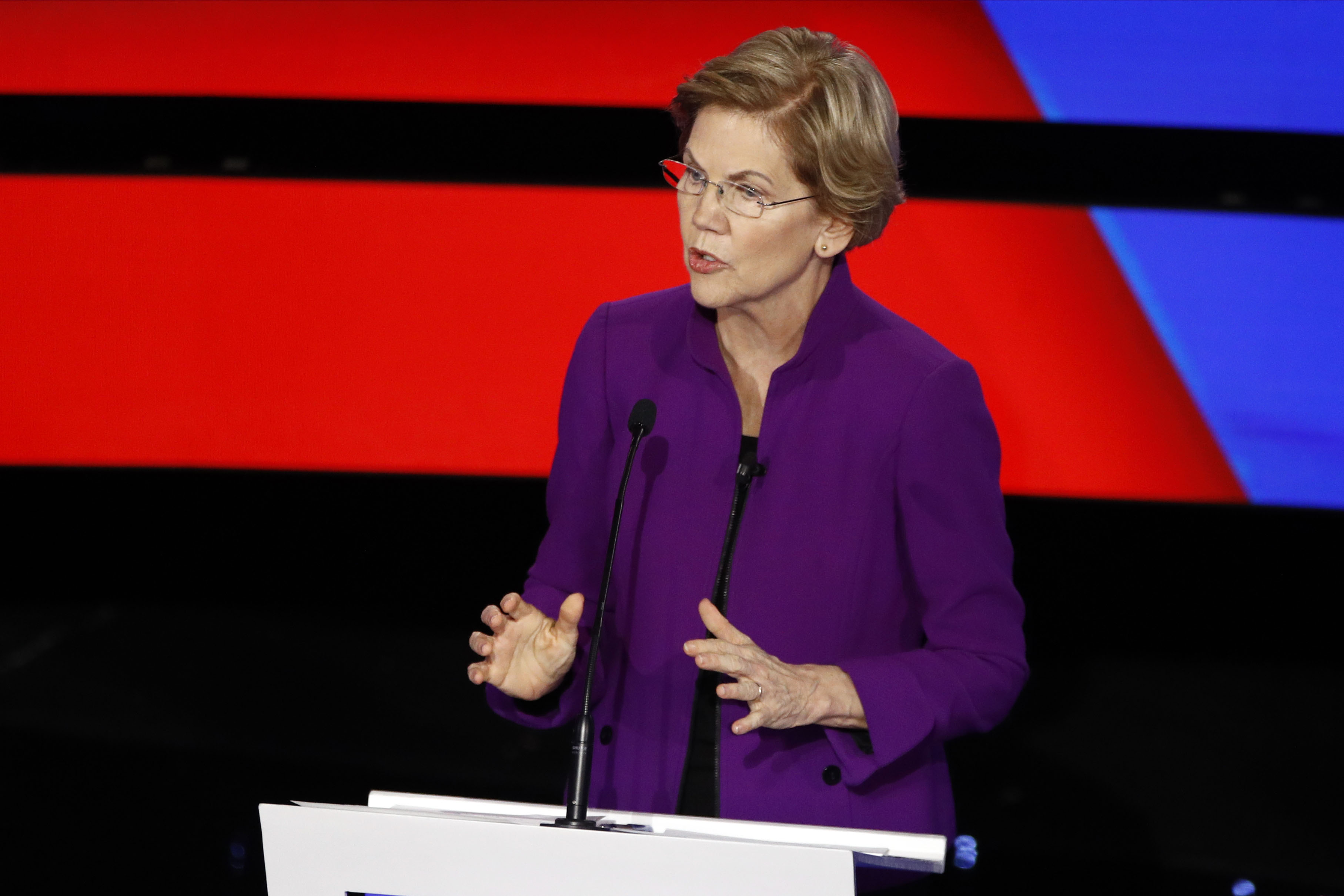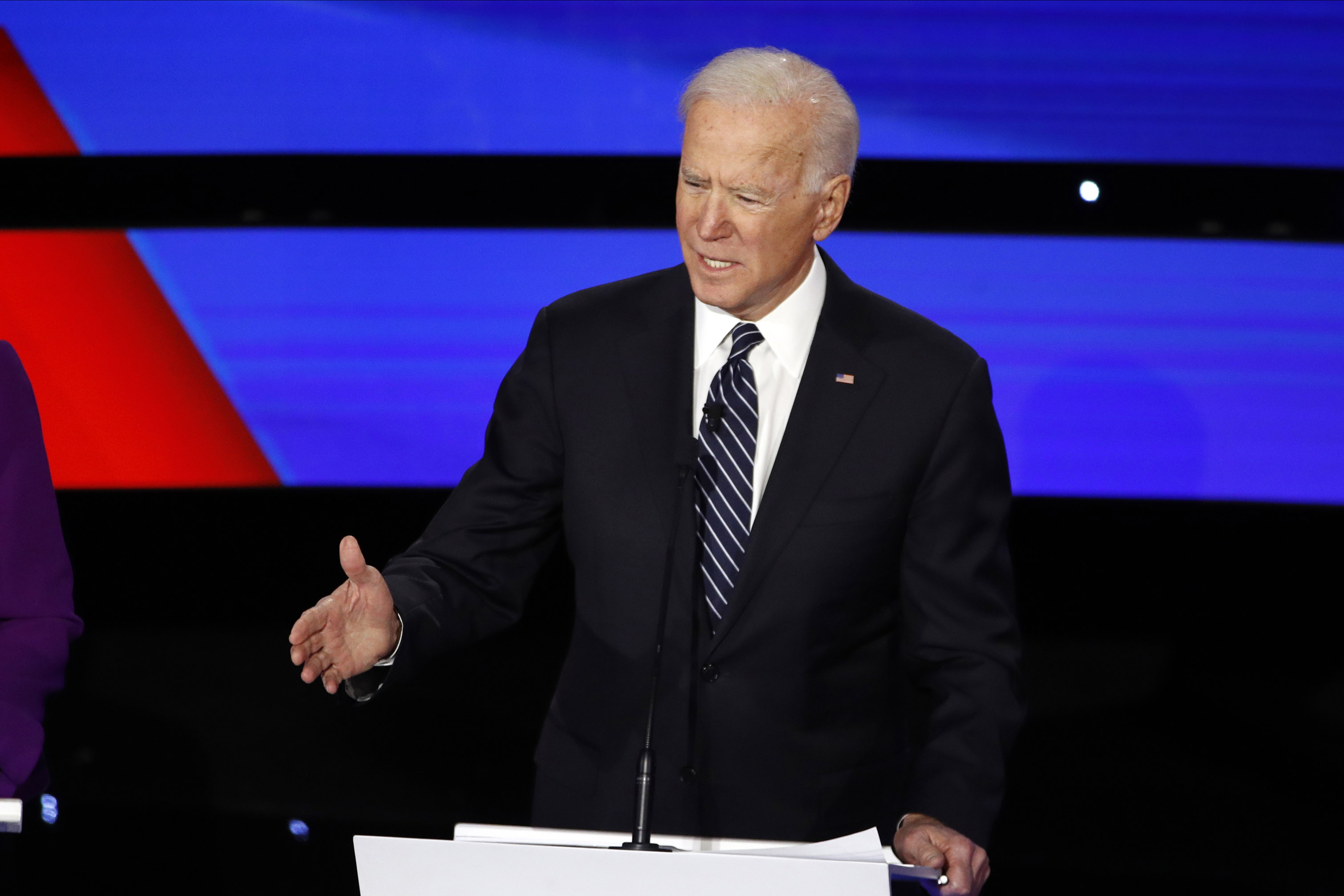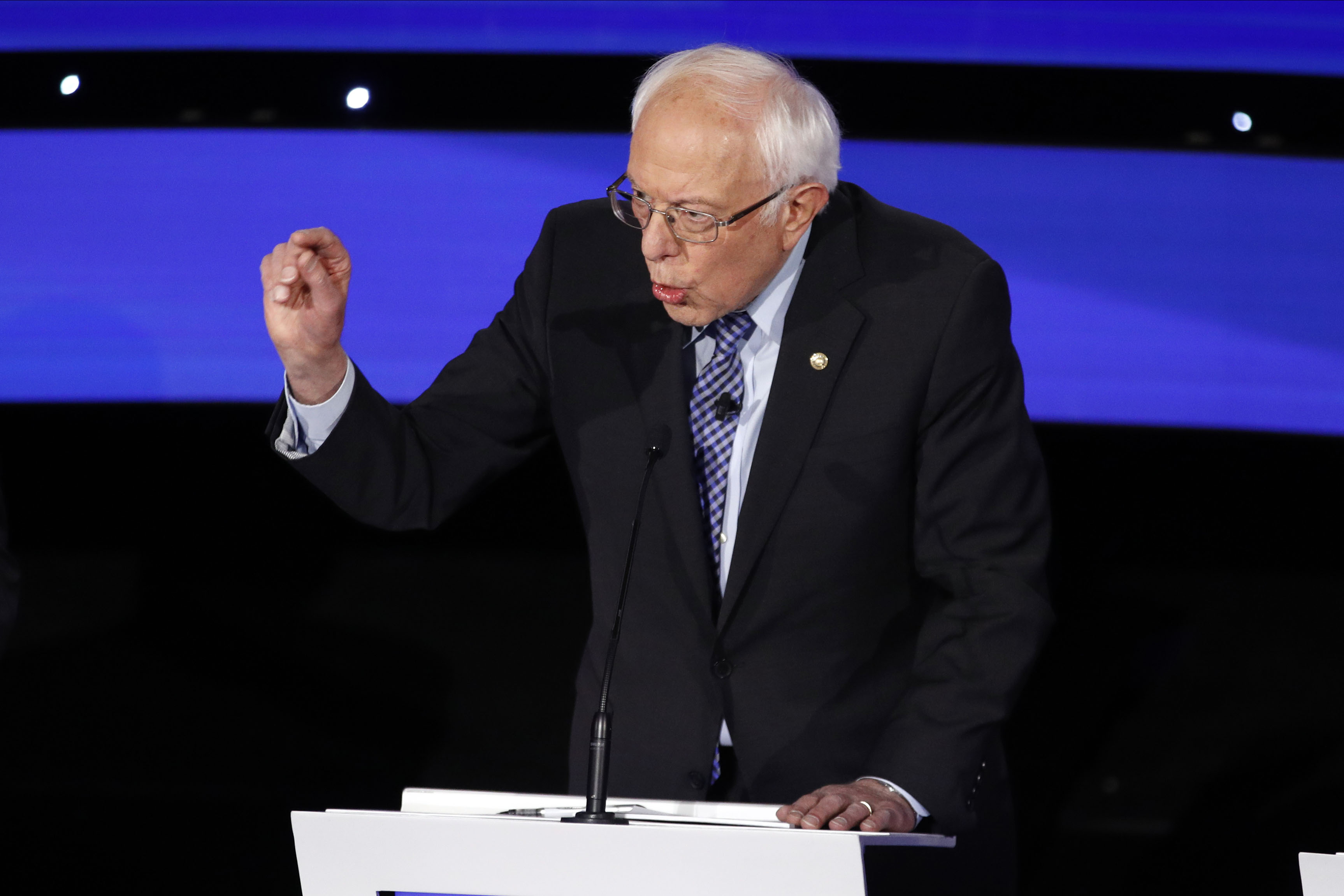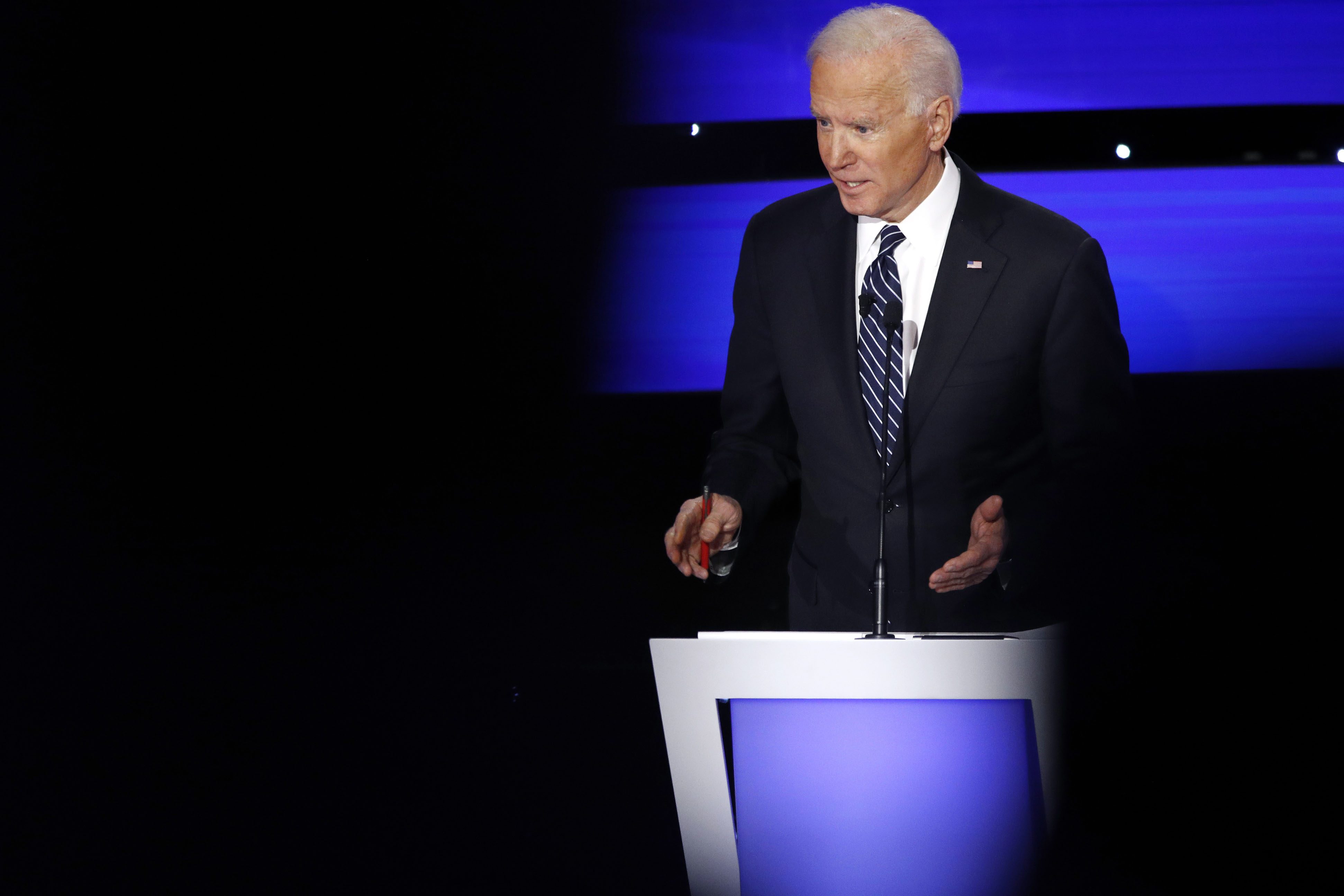Get PolitiFact in your inbox.
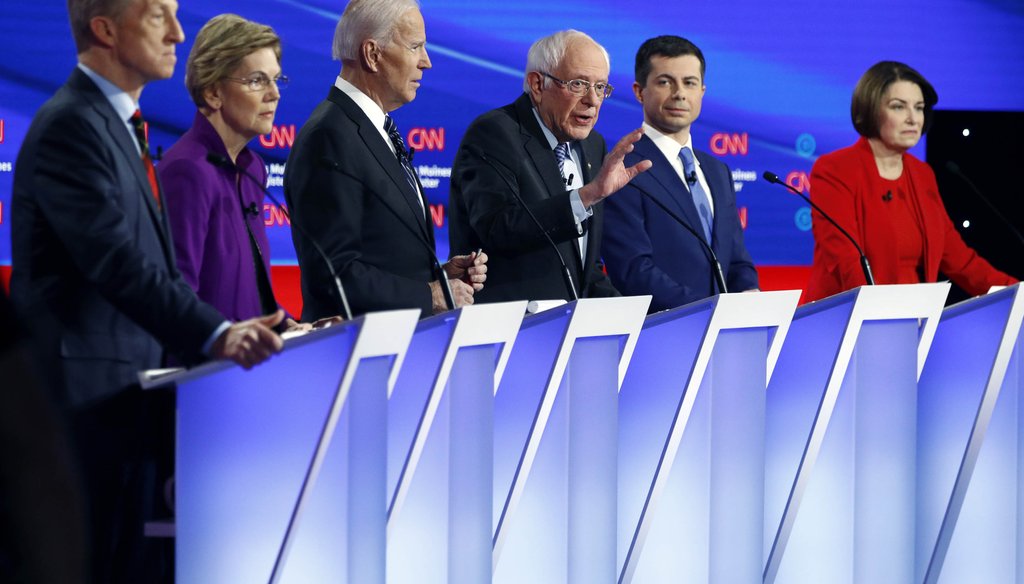
Democratic presidential candidates listen Jan. 14, 2020, during a Democratic presidential primary debate hosted by CNN and the Des Moines Register in Des Moines, Iowa. (AP)
Bernie Sanders and Elizabeth Warren, ideologically aligned on the left, split sharply at the seventh Democratic presidential primary debate in Des Moines over a CNN story that claimed Sanders told Warren privately that he didn’t think a woman could win the White House in 2020.
Sanders denied that such words would ever cross his lips. He cited video from 30 years ago where he argued that a woman could be president.
That said, the next question to Warren was, "What did you think when Sen. Sanders told you a woman could not win the election?"
"I disagreed," Warren said. "Bernie is my friend, and I am not here to try to fight with Bernie."
Given that only Sanders and Warren were in the room for that exchange, there’s no way to know for sure who said what.
But there were moments during the two-hour Jan. 14 debate that were ripe for a fact-check. Here are a few:
Democratic presidential candidate Sen. Elizabeth Warren, D-Mass., speaks Jan. 14, 2020, during a Democratic presidential primary debate hosted by CNN and the Des Moines Register in Des Moines, Iowa. (AP)
In the same back-and-forth with Sanders, Warren said that the test of whether a woman could win lies with results.
"Look at the men on this stage. Collectively, they have lost 10 elections," she said. "The only people on this stage who have won every single election that they’ve been in are the women, Amy and me."
Warren’s claim is correct. We rated it True.
Here’s a rundown of the electoral win-loss records of the six candidates on stage during the debate, according to Ballotpedia.com and the U.S. Election Atlas. To see which elections the candidates lost, read our full fact-check.
Warren: All wins
Klobuchar: All wins
Pete Buttigieg: One loss
Joe Biden: Two losses
Sanders: Seven losses
Tom Steyer: This is Steyer’s first race for public office.
— Louis Jacobson and Jon Greenberg
Democratic presidential candidate former Vice President Joe Biden speaks Jan. 14, 2020, during a Democratic presidential primary debate hosted by CNN and the Des Moines Register in Des Moines, Iowa. (AP )
Former Vice President Joe Biden said that Trump "flat out lied" when he said that he ordered the strike against Iran’s Qassem Soleimani "because our embassies were about to be bombed."
We don’t have access to the intelligence that drove the decision to take Soleimani out. In public statements, Trump’s team has contradicted themselves on the "imminent threat" posed by Soleimani and the need for preemptive action against him.
Trump has described the threat a few different ways: as an attack on a single embassy, as an attack on an unspecified number of embassies, and most recently as an attack on four embassies, including the one in Iraq. And, he’s said that "it doesn’t really matter."
In a Jan. 10 interview with Fox News talk show host Laura Ingraham, Trump said four embassies, including the embassy in Baghdad, were at risk. But top officials did not substantiate Trump’s "four embassies" claim on the Sunday news shows.
Defense Secretary Mark Esper said on CBS’s "Face the Nation" that he "didn’t see" any specific evidence showing Soleimani was planning attacks against four U.S. embassies.
Secretary of State Mike Pompeo said during a Jan. 9 interview that the intelligence agencies did not know "precisely when" or "precisely where" any attacks would take place.
National Security Adviser Robert O’Brien offered more support for Trump’s claim that intelligence showed Iran had drawn up attacks against four U.S. embassies. But he did not provide details.
Several lawmakers, including members of both parties, said Esper and Pompeo didn’t mention threats facing four embassies during the classified briefing.
— Amy Sherman
Democratic presidential candidate Sen. Bernie Sanders, I-Vt., speaks Jan. 14, 2020, during a Democratic presidential primary debate hosted by CNN and the Des Moines Register in Des Moines, Iowa. (AP)
Bernie Sanders zeroed in on the question of profits in the health care industry during the debate.
Under "Medicare for All," he said, "We end the $100 billion a year that the health care industry makes."
The Sanders campaign shared its math, and it’s comprehensive. We rated Sanders’ claim True.
The $100 billion total comes from adding the 2018 net revenues — as disclosed by the companies — for 10 pharmaceutical companies and 10 companies that work in health insurance.
The total net revenues, or profits, these companies posted in 2018 comes to just more than $100 billion — $100.96 billion, in fact. We also spoke to three independent health economists, who all told us that the math checks out.
There are a couple of wrinkles to consider. Some of the companies included do more than just health care. Those other services likely affect their bottom lines.
Also, $100 billion is likely an underestimate.
There are more than just 10 pharmaceutical companies, and more than 10 insurance companies. And this figure looks at pharmaceutical companies and insurance companies, but it doesn’t include the biggest source of health care profits: hospitals and physicians.
— Shefali Luthra, Kaiser Health News
Democratic presidential candidate former Vice President Joe Biden speaks Jan. 14, 2020, during a Democratic presidential primary debate hosted by CNN and the Des Moines Register in Des Moines, Iowa. (AP )
The debate opened with Sanders talking about why he voted against the Iraq War, and Biden explaining why he did. Biden defended himself, pointing out that his regret over the vote..
"I said 13 years ago it was a mistake to give the president the authority to go to war if, in fact, he couldn’t get inspectors in Iraq to stop what was thought to be the attempt to get a nuclear weapon," Biden said. "It was a mistake, and I acknowledge that."
It was more like 14 to 15 years ago, but this time — as opposed to previous occasions — Biden avoided saying that he was against the Iraq War from the very beginning, which he wasn’t.
Around the start of the Iraq War, Biden acknowledged his frustrations with how the United States entered the conflict but said he supported President George W. Bush. He later said that support was a mistake.
In 2002, Bush argued that former Iraq President Saddam Hussein had chemical and biological weapons and sought nuclear weapons. In October of that year, as a Delaware senator, Biden voted in favor of a resolution that authorized Bush to use military force against Iraq if needed.
In a Senate speech before voting for the resolution, Biden said that "failure to overwhelmingly support" the measure was "likely to enhance the prospects that war will occur." In a March 19, 2003, interview with CNN — the day before the U.S. invaded Iraq — Biden doubled down on his commitment to the war.
"I support the president. I support the troops. We should make no distinction," Biden said. "We should have one voice going out to the whole world that we're together. There's plenty to criticize this president for. Let's get this war done."
At a Brookings Institution event in July 2003, Biden criticized the Bush administration’s approach to the Iraq War while still defending his vote.
Then, in a November 2005 interview on NBC’s "Meet the Press," Biden went a step further and said his 2002 vote was a mistake.
"It was a mistake," Biden said. "It was a mistake to assume the president would use the authority we gave him properly. … We gave the president the authority to unite the world to isolate Saddam. And the fact of the matter is, we went too soon. We went without sufficient force. And we went without a plan."
— Daniel Funke and Louis Jacobson
We’re having a déjà vu moment.
"Back in 1986, I introduced the first climate change bill. And check PolitiFacts (sic) — they said it was a game-changer," Biden said during the debate.
Biden made this same claim during the fifth Democratic debate in Atlanta in November. We found that Biden was one of the first U.S. lawmakers to introduce climate change legislation. But for the record: We did not call it a game-changer.
Here’s what we wrote in November:
His first climate change bill was introduced in 1986, but it died in the Senate. The next year, a version of Biden’s legislation became an amendment to a State Department funding bill. President Ronald Reagan signed it into law.
Biden’s Global Climate Protection Act called on the president to set up a task force to plan how to mitigate global warming. It also called on the president to make climate change a higher priority item on the U.S.-Soviet agenda.
While Congress had focused on the issue before, most experts we spoke to said Biden’s bill was the first climate change legislation of its kind. However, those same experts also cautioned against overstating the importance of the bill. It didn’t introduce a plan for reducing emissions or adapting infrastructure for climate change.
"It was a plan to make a plan. Which, of course, neither Reagan nor Bush ultimately did," Josh Howe, a professor of history and environmental studies at Reed College, previously told PolitiFact.
— Daniel Funke
Our Sources
See fact-checks.
